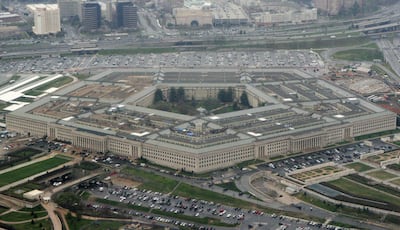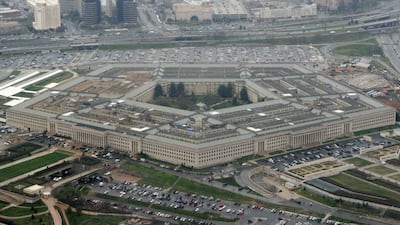On July 23, The New York Times ran a story, citing a defence contractor, who said that the US Department of Defence may be in possession of "off-world vehicles not made on this earth".
The quote is the capstone of three years of investigative reporting by the Times, which began with articles in 2017, including a front-page story revealing that the Pentagon was still operating a UFO research programme assumed to have been shut down years earlier. The 2017 articles also included leaked videos captured by the US Navy between 2004 and 2015, showing its pilots tracking strange, unidentified aircraft that seemed to defy our current understanding of aeronautics in our atmosphere.

Chad Underwood, the fighter pilot who captured one of the videos, has said that the object he was tracking "wasn't behaving within the normal laws of physics". His commanding officer at the time, David Fravor, has also made similar statements about a different object he encountered on the same day.
For three years, a whole host of scientists and casual sceptics have rounded on the videos, Mr Underwood, Mr Fravor and the New York Times reporters in an effort to pick it all apart. And there are valid reasons for scepticism. It is possible that there are explanations other than out-of-this-world technology for what US Navy pilots have seen. And yet, the story remains extraordinary because, after three years of it being out in the world, the Pentagon seemingly remains unconvinced by the explanations sceptics have proffered.
This April, the Department of Defence formally acknowledged the videos to be real, and stated that the "aerial phenomena observed [within them] remain characterised as 'unidentified'".
And that brings us back to July 23. The story that discusses “off-world vehicles” also quotes former and serving US lawmakers, who are reluctant to make any claims at all about aliens. But they refer to reports of similarly mysterious aircraft that have appeared over US military bases with technology potentially “not in the American arsenal”.
Marco Rubio, the Republican who currently chairs the Senate Select Committee on Intelligence, is more concerned that it is evidence of “some technological leap” made by one of the US’s terrestrial rivals. “Maybe there is a completely, sort of, boring explanation for it. But we need to find out,” Mr Rubio said.
Unless the US defence department has been duped into creating a multi-year, multi-million-dollar, partially classified research project around an innocuous prank or natural phenomenon, the little commentary that has come out from lawmakers and military officials points to two possibilities. Both of them would present mysteries that merit huge attention and investment.

The first is that some country other than the US has developed materials and technological capabilities, possibly as far back as 2004, that baffle the US defence community in 2020, and make US Navy pilots question their understanding of aerodynamics. This would be particularly extraordinary given the interconnectedness of the global scientific and defence research community, and that the US spends far more than every other country on defence.
The second possibility is that there are advanced aliens.
Amazingly, that suddenly doesn’t seem so unreasonable. Shocking, but not beyond all reason. So why isn’t the whole world talking about aliens right now?
The classic explanation is that, for all of the scientists, policymakers and defence strategists who would lead the discussion, it's just too embarrassing. As Christopher Mellon, a former US deputy assistant secretary of defence, has put it, "No one wants to be the 'alien guy' in the national security bureaucracy; nobody wants to be ridiculed or sidelined for drawing attention to the issue".
Few journalists, it seems, want to be “the alien guy” either, considering the relative absence of aliens from the global news cycle over the last fortnight. There are very interesting questions to be asked about the role of shame and social standing in everything from journalism to scientific achievement to national security.
Another explanation is the ongoing coronavirus pandemic. Many stories, from the desert locust plague that has ravaged dozens of nations’ food supplies to deadly violence between soldiers from two nuclear powers, have fallen by the wayside in a coronavirus-stricken world.
There is a certain worldwide humbling occurring. The Covid-19 pandemic has revealed many of our civilisation's socioeconomic cracks, and we just don’t have the headspace to think beyond the surface of the Earth. Medical science is in a fight that there is no guarantee of winning very soon. Economic inequality and poverty are going up as food security and growth go down.
It is a sign of just how many issues are occupying the collective mind of the human race that our curiosity is only minimally piqued by what has been trickling out of the Pentagon. Even as we continue to shuttle astronauts to low-earth orbit and plan missions to Mars, the gravity of our planet weighs particularly heavily on us just now.
For over four decades since the "golden record" launched with Nasa's Voyager spacecraft in 1977, there have been co-ordinated, international efforts to broadcast messages to deep space in the faint hope that there is someone out there, waiting in vigil and listening.
How tragic it would be if evidence of alien life mounted, and it was we who were neither vigilant nor listening.
Sulaiman Hakemy is deputy comment editor at The National


